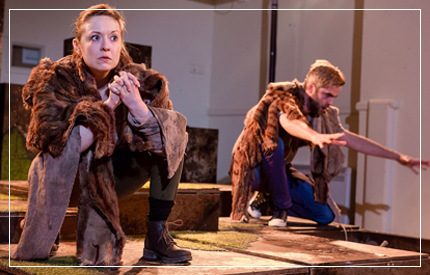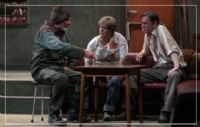This Land
Date: 18/04/2016
Theatre Review

Had Siân Owen's This Land, directed by Jo Newman for the Pentabus Theatre Company and the Salisbury Playhouse, not been inspired by fracking - that is to say, exploratory drilling for oil and gas, otherwise known as hydraulic fracturing - it may still be a cracking play. But it is, and that makes it a cracking fracking play. Or rather, a cracking play that features fracking. The real fractures in This Land exist in lives, loves, objects and, most importantly, identities, above and below the surface.
Contrary to lyrics Woody Guthrie famously sang, This Land asks: "Is this land really our land?" A question that has surely crossed the minds of Joseph, played by Harry Long, and Bea, played by Rosie Armstrong. This thirtysomething couple are faced with the prospect of how fracking near their home will fracture (yes) their young son’s upbringing, their relationship, and their land.
Digging deep into how unwanted external intervention can put pressure on a family both financially and romantically, Newman, Long and Armstrong slowly unveil powerful profundity. Initial feelings of hope and determination, gently entwined with quiet forlornness, precede over-eagerness, desperation and pain. Bea might not be as ready for motherhood as she once believed. There will come a time when Bea and Joseph's soil will no longer be able to support them. And what will become of their house, the foundations that they built a family and living upon? Will they stay, or will they go?
The grim sight of the couple clinging on to each other as the ground shakes around them is the epitome of clinging on to the final vestiges of identity of surroundings ingrained by historical development and stained both by present and future development. It's both heartrendingly humanistic and painfully nihilistic.
If that were all, This Land would be powerful enough. But Owen, Newman and the actors uncover further depths by taking the narrative back and forward in time. The inventive, earthy set is packed with detail - trapdoors open pits, props function as symbolic discoveries, and, perhaps most ingeniously, a sign at the back indicates the year.
Travelling from the Stone Age, to Roman times, to the eighteenth century, to the Second World War, Long and Armstrong play multiple characters, introducing a "not so different after all" aspect to the production. In 193 AD, Long's Roman consultant tries to get Armstrong’s farmer off land where a Roman road is supposed to go. Is it any coincidence that the Roman is dressed in Superman's colours, giving him a feeling of empirical superiority over someone he feels shouldn't stand "in the way of progress"? And what sort of progress will that be? This ties in neatly alongside a 1770 scene in which a feat of engineering is achieved without everything necessary to make it work: an exhibition of not thinking supposedly great ideas through. Later, Bea's stubborn streak is reflected in her grandmother, also played by Armstrong, in 1941.
There's also a geologist, a fairy queen, and a futuristic ending of amazing audacity. Science, logic, fantasy and dystopia rolled into one - over-ambitious though it sounds, it works incredibly well.
This Land is not perfect. When contrasted with the invention and heart around them, a pair of monologues come across as rather lecture-like, well-presented though they are. But, like the first act's somewhat slow pacing, their application is understandable in hindsight. In answering many questions about what's been done, what's being done and what may still be done to the ground, This Land was made for people to be educated and entertained by. In short - with reference to the great Mr. Guthrie - This Land was made for you and me.
Simon Fallaha
This Land toured Northern Ireland from April 6 – 9, playing at the Riverside Theatre in Coleraine, the Strule Arts Centre in Omagh, the Waterside Theatre in Derry and the MAC in Belfast.
Contrary to lyrics Woody Guthrie famously sang, This Land asks: "Is this land really our land?" A question that has surely crossed the minds of Joseph, played by Harry Long, and Bea, played by Rosie Armstrong. This thirtysomething couple are faced with the prospect of how fracking near their home will fracture (yes) their young son’s upbringing, their relationship, and their land.
Digging deep into how unwanted external intervention can put pressure on a family both financially and romantically, Newman, Long and Armstrong slowly unveil powerful profundity. Initial feelings of hope and determination, gently entwined with quiet forlornness, precede over-eagerness, desperation and pain. Bea might not be as ready for motherhood as she once believed. There will come a time when Bea and Joseph's soil will no longer be able to support them. And what will become of their house, the foundations that they built a family and living upon? Will they stay, or will they go?
The grim sight of the couple clinging on to each other as the ground shakes around them is the epitome of clinging on to the final vestiges of identity of surroundings ingrained by historical development and stained both by present and future development. It's both heartrendingly humanistic and painfully nihilistic.
If that were all, This Land would be powerful enough. But Owen, Newman and the actors uncover further depths by taking the narrative back and forward in time. The inventive, earthy set is packed with detail - trapdoors open pits, props function as symbolic discoveries, and, perhaps most ingeniously, a sign at the back indicates the year.
Travelling from the Stone Age, to Roman times, to the eighteenth century, to the Second World War, Long and Armstrong play multiple characters, introducing a "not so different after all" aspect to the production. In 193 AD, Long's Roman consultant tries to get Armstrong’s farmer off land where a Roman road is supposed to go. Is it any coincidence that the Roman is dressed in Superman's colours, giving him a feeling of empirical superiority over someone he feels shouldn't stand "in the way of progress"? And what sort of progress will that be? This ties in neatly alongside a 1770 scene in which a feat of engineering is achieved without everything necessary to make it work: an exhibition of not thinking supposedly great ideas through. Later, Bea's stubborn streak is reflected in her grandmother, also played by Armstrong, in 1941.
There's also a geologist, a fairy queen, and a futuristic ending of amazing audacity. Science, logic, fantasy and dystopia rolled into one - over-ambitious though it sounds, it works incredibly well.
This Land is not perfect. When contrasted with the invention and heart around them, a pair of monologues come across as rather lecture-like, well-presented though they are. But, like the first act's somewhat slow pacing, their application is understandable in hindsight. In answering many questions about what's been done, what's being done and what may still be done to the ground, This Land was made for people to be educated and entertained by. In short - with reference to the great Mr. Guthrie - This Land was made for you and me.
Simon Fallaha
This Land toured Northern Ireland from April 6 – 9, playing at the Riverside Theatre in Coleraine, the Strule Arts Centre in Omagh, the Waterside Theatre in Derry and the MAC in Belfast.




































